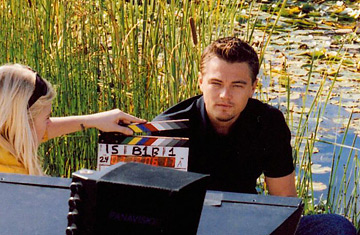
Leonardo DiCaprio while filming The 11th Hour.
Any film, book, magazine article, song, music festival, blog, lecture or conversation that tries to raise awareness on climate change has to overcome the condition of our age: environmental overkill. Nowadays you'd have to have your head buried in Arctic ice to be unaware of global warming, and that's melting fast anyway. The makers of the new eco-documentary The 11th Hour address this problem in two ways. One, they keep the pace of the film humming, shifting rapidly from interview to interview with environmentalists, skipping from the seas rising to the air dimming to the endless evils of oil corporations. Second, they bring out Leo.
That would be Leonardo DiCaprio, the Prius Prince of Hollywood, who narrates The 11th Hour, and gets a producing credit as well. (The documentary was written and directed by sisters Leila Conners Petersen and Nadia Conners, who co-founded the green entertainment company Tree Media.) DiCaprio's lightly goateed presence, framed against open skies and dizzy cityscapes, serves the film well, which is to say he's a lot more bearable over the course of 90 minutes than Al Gore. He helps make the 11th Hour one of the most affecting additions to the new genre of Coming Environmental Catastrophes and How to Deal with Them.
Those who've been paying attention the last few years won't hear anything radically new, though the honor roll of experts interview in the film — sages like David Suzuki and unexpected wonks like former CIA director James Woosley — deliver bite-size, sometimes haunting bits of wisdom. The best is in the first quarter of the film, when lesser-known environmentalists like Paul Hawker and Janine Bonyus explain why it seems to be instinctual for human beings to treat nature like garbage. (Short answer: we've come to believe that technology has made us separate from and superior to the planet that still sustains every aspect of our lives.)
After an hour of doom and gloom, the film shifts into problem-solving mode — as it must, to keep us from feeling so much eco-anxiety that we'll want to commit eco-suicide. The solutions promoted here are very much design-oriented, showing all the ways we can plot and plan our way to a more energy-efficient, sustainable tomorrow, today. Green architecture gets star placement, and eco-design gurus like William MacDonough talk about the need to create "cradle-to-cradle" products that can be recycled, or reincarnated, over and over. It might be a conscious choice, and a good one, to appeal to the tech-loving young. Surely if the magnificent human mind can create something as wondrous as the iPhone, we can design a way to live without killing the Earth.
But there's something more at the end, and here Leo becomes a problem. Beyond detailing gee-whiz techno fixes, 11th Hour makes the deeper case that to change our ecological destiny we have to change not just how we live but how we buy. Again and again, we're told that Americans need to stop the insanity of relentless consumption, and instead live simpler, smarter and slower. My dwindling bank account and I are all for it, but there's something not quite right about having that message brought to you by someone like DiCaprio. DiCaprio would neither be wildly rich nor wildly famous — he wouldn't be Leo, in other words — without the efforts of a celebrity machine that runs on extremely conspicuous consumption. It's not that DiCaprio shouldn't be applauded for using much of his celebrity to promote environmental causes — though he obviously keeps some in reserve for the supermodels — but in the new world that the 11th Hour wants to create, that celebrity wouldn't exist at all. That's a bigger condition we can't yet overcome.
